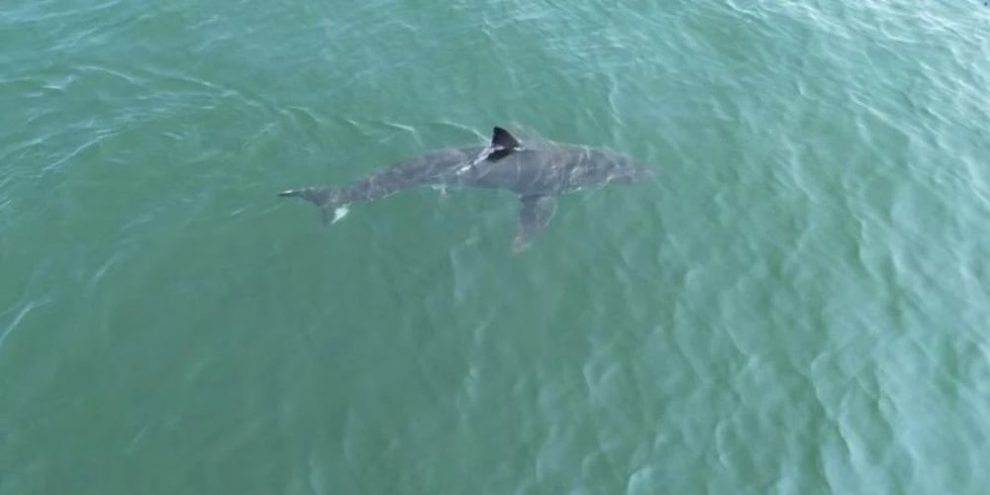
Rick Clough spent some four decades fishing for lobsters and sea urchins off the Maine coast before spotting one of the ocean's most recognized predators — a great white shark.
The approximately 8-foot (2.4-meter) shark, seen off the beach town of Scarborough in July, surprised Clough, but didn’t make him fear the ocean — though he admitted, “I’m not sure I’d want to go urchin diving now.”
Boaters, beachgoers and fishermen like Clough who spend time in the chilly waters of New England and Atlantic Canada are learning to live with great white sharks, the creatures made famous by the 1975 film “Jaws.” Sightings of the apex predators are up in places like Maine, where they were once very rarely spotted.
Scientists link the white shark sightings to increased availability of the seals the sharks feast on, and say beachgoers are generally very safe from shark bites. The sharks can grow close to 20 feet (6 meters) long, though most don't get that big.
David Lancaster, a commercial clam digger in Scarborough, used a drone to get a look at an approximately 12-foot (3.6-meter) shark near the town’s famed beaches earlier this month. He described the animal as “magnificent” and “really amazing” to see. But he also said the shark's presence reminded him that swimmers need to look out for the big fish.
Barrie's News Delivered To Your Inbox
By submitting this form, you are consenting to receive marketing emails from: Central Ontario Broadcasting, 431 Huronia Rd, Barrie, Ontario, CA, https://www.cobroadcasting.com. You can revoke your consent to receive emails at any time by using the SafeUnsubscribe® link, found at the bottom of every email. Emails are serviced by Constant Contact
Why are great whites going north?
Sightings of great whites off Cape Cod, Massachusetts, have become increasingly frequent in recent years, and the Atlantic White Shark Conservancy has documented hundreds of the animals over more than a decade. But new data shows the sharks are heading even farther north into New Hampshire, Maine and beyond, said Greg Skomal, a senior fisheries biologist with the Massachusetts Department of Marine Fisheries and a veteran white shark researcher.
The number of white sharks detected off Halifax, Nova Scotia, increased about 2.5 times from 2018 to 2022, according to a paper published by Skomal and others in May in the journal Marine Ecology Progress Series. Even farther north, the number detected in the Cabot Strait that separates Nova Scotia and Newfoundland increased nearly four times over, the paper said.
Skomal said the average residency in these northern waters has also increased from 48 days to 70 days, suggesting that white sharks appear to be increasingly comfortable farther north.
A key reason for the shift seems to be the successful conservation of seals off New England and Canada via laws such as the Marine Mammal Protection Act, which has allowed seals to thrive and provide a food source for the predatory sharks, Skomal said.
“It could be a function of a growing prey base,” Skomal said. “And that would be seals.”
Sharks are protected, too
Great white sharks also benefit from protections, including a ban on fishing for them in U.S. federal waters that has stood since 1997. They are still considered vulnerable by the International Union for the Conservation of Nature.
In Massachusetts, the marine fisheries department said it strengthened its fishing laws after fishermen in 2024 chose to target white sharks anyway. The state prohibited the use of certain kinds of heavy fishing gear in shoreline areas where white sharks are most commonly found.
“We believe here in Massachusetts that targeting white sharks from the beach is not a safe practice,” Skomal said. “Not only because it could result in the death of the shark, but because it could be a public safety issue.”
Despite the size and strength of the sharks, dangerous encounters between white sharks and humans are vanishingly rare. Worldwide, there have been fewer than 60 fatal great white shark bites on humans in recorded history, according to the International Shark Attack File at the Florida Museum of Natural History.
Living with great whites
The first recorded fatal shark attack in Maine happened in 2020 when a great white shark killed 63-year-old Julie Dimperio Holowach off Bailey Island.
“It’s an exceedingly rare event. But we’re providing all of this information to mitigate human behavior and hopefully reduce any negative encounters between humans and sharks,” said Ashleigh Novak, research coordinator with the Atlantic White Shark Conservancy.
The growth of social media has made shark sightings go viral in recent summers. A smartphone app called Sharktivity also allows shark spotters to report their sightings.
Lancaster, a surfer, said living with great whites is just something people in New England are going to have to adjust to.
“It's crazy that they are around, as fishermen and surfers, and something we have to accept,” Lancaster said. “It's in the back of your head, but you have to accept it.”





